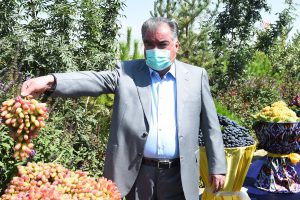While Kyrgyzstan’s parliamentary election, set for October 4, is a roiling sea of parties contesting for votes from a very much undecided electorate, neighboring Tajikistan’s presidential election, to be held on October 11, is more straightforward.
President Emomali Rahmon has, over the course of his 28 years in power, pushed all serious political challengers off the board. While Tajikistan has an array of political parties — Communists, Socialists, Democrats, the Agrarian Party, and others — they seldom make news and one would be hard-pressed to figure out how they impact the making of state policy or advocate on the behalf of their constituents. Tajikistan, like much of Central Asia, equates the trappings of democracy (parties, legislatures, elections) with the existence of a democracy.
The country’s last sizable and serious opposition force, the Islamic Renaissance Party (IRPT), was essentially hounded out of existence in 2015 by the government. Facing erroneous accusations of terrorism and extremism, the IRPT’s leaders fled the country or were arrested. There isn’t space in Rahmon’s Tajikistan for opposition.
In many previous Tajik presidential elections, potential opposition challengers to Rahmon never even made it to election day. In 2013, the IRPT and the Socialist Democratic party (whose leader is boycotting the 2020 election) jointly backed an independent female candidate, human rights advocate Oinikhol Bobonazarova. She didn’t make it to the ballot, however, failing to submit paperwork with the required number of signatures. That same year, Zayd Saidov, a Tajik businessman and former government official, announced the creation of a new political party “New Tajikistan” with eyes on contesting the presidential election. Saidov was threatened and then arrested (eventually so too were his lawyers) and is serving a 29-year prison term in Tajikistan.
The 2020 election appears to be following the usual course.
Last week, a 30-year-old lawyer from Tajikistan’s eastern Gorno-Badakhshan Autonomous Region (GBAO), Faromuz Irgashev, announced his intent to run for the presidency via a YouTube video. As Eurasianet explained, Irgashev linked his decision to run to witnessing police abuse in Khorog and GBAO more widely. In an interview with Asia Plus, an independent Tajik news outlet, Irgashev laid out his ideas: direct election of regional and city leaderships, abolition of state monopolies, attracting international universities to open branches in Tajikistan, and more.
He was almost immediately visited by officers from the State Committee for National Security (SCNS, the successor organization to the Soviet-era KGB), according to RFE/RL. Security officers reportedly took him for a “long walk” and a chat.
How far Irgashev’s campaign goes is well worth watching. By framing his intention to run for the presidency as an effort to combat abuse, injustice, and corruption Irgashev sets himself apart from other declared candidates and Rahmon, who represent the status quo.
The Socialist Party’s Abduhalim Gafforov was again nominated by his party, as he was in 2006 and 2013. In those elections he gathered just 2.8 percent (2006) and 1.5 percent (2013) of the votes. Per reporting from Asia Plus, the party’s platform focuses on “selection of personnel in government structures, health care, privatization of state property, culture and education.” The Communist Party’s platform promises a “decent life for every citizen of the country.”
Current President Emomali Rahmon has been nominated by not just his political party — the People’s Democratic Party — but also the Federation of Independent Trade Unions and the Union of Tajikistan’s Youth. That sounds more impressive than it is. As Eurasianet noted, with regard to the Federation of Independent Trade Unions: “Contrary to its name, the federation is not known to be genuinely involved in any union activity and appears only once every few years for the purpose of nominating Rahmon as a presidential candidate.”
Ultimately, the likelihood that Rahmon will have a serious challenger to face come October 11 is small. If history is any guide, the other declared candidates running will function as simple democratic scenery to frame Rahmon’s inevitable victory.

































